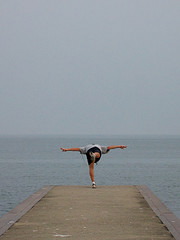 Do you fatigue and stress easily? Do you have trouble concentrating?
Do you fatigue and stress easily? Do you have trouble concentrating?
One of the main tenets of the Alexander Technique is the concept of “primary control“, a phrase coined by Alexander to indicate the importance of freedom in the muscles of the head and neck. (If you want to read a really, really in depth article about primary control go here) He found that the body has no chance of coordinating and flowing in any activity while tension remains in the head and neck. When the neck is free and balanced, the body will order itself more easily.
Most of us respond to stress as any animal would, by going into the “startle position”, with the head pulled back and down, tensing the muscles along the spine, especially the neck. The next time you are really startled, notice how your body recoils and shortens from the top of your head down to your lower back. Yet animals usually revert to a natural, balanced poise when the danger passes. Their physical awareness broadens again to take in the big picture. Since humans are constantly under stress from modern life in general, we tend to stay locked in “startle”. We become habitually unbalanced and our physical spirit suffers.
Personally, I have trouble with concentration. My mind wanders easily, thinking almost compulsively. I’m sure many of you experience the same distracted state. The medical buzzword for this condition is Attention Deficit Disorder, which is a chronic state of distractedness. (And, of course, there are drug treatments for it. Big surprise!) It is a serious issue, especially for adults. However, I am not surprised at this trend, since we have so much to juggle to maintain our busy lives. We maintain and process huge amounts of information thrown at us daily by streamlined technology. Many in modern society live multiple types of lives; for example, raising children and working, often several jobs at once. Driving a car, stressful in itself, hogs a huge amount of time. On top of that, there are constant distractions from our technology; from TV, mobile phones, Internet and pagers. There is little time or space to nurture focus.
For me, forcing myself to concentrate causes stress in the eyes, jaw, mouth, neck and shoulders. This tension aggravates and fatigues me physically. It ends up foiling my attempts to concentrate. This is an example where the physical aspect of living is not only a response to stress, but actually creates and amplifies it. I am learning to concentrate without this physical habit. Primary Control, keeping my head and neck free and soft, is where it all begins.
For example, when reading a book, find a comfortable position, with neck and back supported and balanced. Let your eyes soften and widen, as if they are floating toward your ears. Soften your eyebrows, your jaw, your tongue, your nose. Let your neck release forward and up. Keep your eyes open, and notice the room around you. Fill that space with your awareness. Broaden your vision to take in the room without processing or thinking about what’s in it or what needs to be done. Now, when you begin to read, keep that softness in the awareness. Don’t shutter out everything but the book. It may be tricky to read and stay physically broad. It is for me. But, like riding a bicycle, it will become natural. It’s about balance, being physically present while your mind reads. Your eyes and head and neck don’t read; your mind does.
When the body is poised, it is available to be used for living with quality. When “primary control” is implemented, the whole body-mind-spirit follows and is freer. That physical freedom and balance in the body also raises the quality of mental activity, which is part of the body package. Meditative states are basically the practice of poised mind and body. When one learns to live in a more liberated, balanced state, one is free to choose almost any path from there, without hindrances of tension and poor body use.
 It sounds comical if you say it enough times, like the sound of a bag of beans or rice plopping on the counter: “Think!”.
It sounds comical if you say it enough times, like the sound of a bag of beans or rice plopping on the counter: “Think!”.

